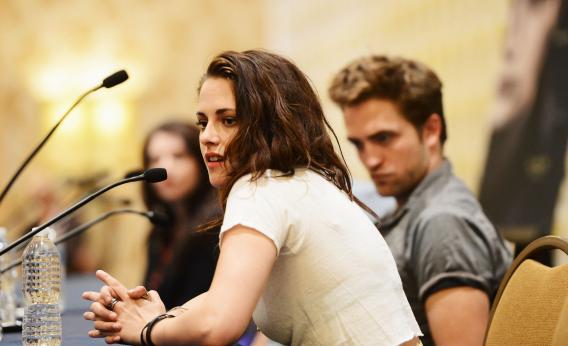Is there a young actress working today who is more associated with the lingering power of fairy tales than Kristen Stewart? Saorsie Ronan got her start as the canker in the rose in Atonement, went on to play a rape and murder victim in The Lovely Bones, and is now embracing action roles as a brainwashed young killer in Hanna and an alien implanted in a human body in The Host. Jennifer Lawrence came to national attention as a determined young girl in the Ozarks in Winter’s Bone, went on to play a budding supervillain in X-Men: First Class, and then Katniss Everdeen, to whom romance comes second to survivalism, in The Hunger Games.*
But despite her forays into nervier fare (The Runaways, Adventureland), Stewart remains, first and foremost, defined by her roles as a princess. As Bella Swann in the five Twilight movies, she is the ordinary girl lifted from her mundane existence into a magical realm, recognized as special even by the rareified creatures who populate her new world. Vampires are her fairy godmothers, clothing her in finery not just for one special evening, but forever. And one particular vampire is her fairy tale prince. In Snow White and the Huntsman, the second franchise with which Stewart will be associated after the success of the first movie this spring, her princess role is literal rather than metaphorical. And she’s not just any girl with a title and a dress, but one who says the Lord’s Prayer in the cell where her stepmother has imprisoned her, a pure martyr for her country, glowing chastely in the direction of the rough-hewn Huntsman who, hired to kill her, switches sides and becomes her champion.
And now the princess is a cheater. US Weekly broke the news earlier this week that Stewart had cheated on Robert Pattinson, her boyfriend of three years, and the man who plays her vampire boyfriend-turned-husband Edward Cullen in the Twilight franchise, with married Snow White and the Huntsman director Rupert Sanders, shattering not just the illusion that they were a happy couple, but also the idea of Stewart at the embodiment of fairy tale love. It may be unrealistic to expect that young first loves, especially ones who are constantly separated by travel for work, will end up together in the end. But much of Stewart’s career is predicated on the fact that people want to believe in the power of love unbroken by banked fires, boredom, or worst of all, infidelity.
Stewart’s agonized public apology—“This momentary indiscretion has jeopardized the most important thing in my life, the person I love and respect the most, Rob. I love him, I love him, I’m so sorry”—may be the real stuff of grown-up relationships. But the pain, complexity, and forgiveness of that narrative is decidedly less marketable than the perpetual passion Bella is supposed to find for Edward after her transformation into a vampire in the final installment of the Twilight movies, due in theaters on November 16.
Even if she hadn’t been caught by photographers with her married director, Stewart would have had to face up to the limitations of the fairy tale at some point. The Twilight audience hasn’t followed Stewart to her smaller movies, all of which have done decidedly modest box office. And in the upcoming adaptation of Jack Kerouac’s On the Road, her character Marylou is naked and sexually voracious, a turn that might appeal to new, and male audiences, but is hardly in line with what her core fans expect from her.
Being a princess can bring big box office returns and adoring fans, particularly if those fans believe that the fairy tale has power in the real world. But if the appeal of gorgeous dresses and the handsome prince ever falter, the expectation to live up to legend can be as confining, and unforgiving, as any iron-barred tower.
*Correction, July 27, 2012: The official setting of Winter’s Bone is in the Ozarks, which is close to but geographically distinct from Appalachia.
